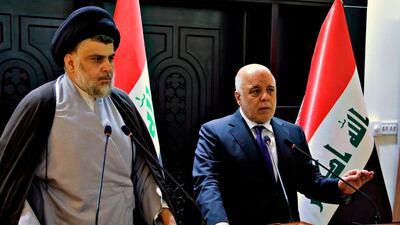In a move casting a shadow over Iraq's electoral process, Prime Minister Haider Al Abadi has banned some members of the country's electoral commission from travelling after "serious violations" were reported in the recent elections.
The prime minister has said he holds Iraq’s Independent High Electoral Commission (Ihec) responsible following reports of vote rigging in the May 12 ballot.
Allegations of ballot stuffing and voter fraud emerged even before polls closed last month. On May 27, Mr Al Abadi formed a committee of financial, intelligence and security experts to investigate.
____________
Read more:
Angry Iraqi Kurds file election complaints with Baghdad
Iraqi Prime Minister dismisses demands for repeat election
Iraq's PM congratulates Moqtada Al Sadr on election performance
____________
The committee, which presented its findings to the cabinet this week, recommended a manual recount of five per cent of votes to compare against figures produced by electronic voting machines, which some fear could have been hacked. The committee also recommended cancelling the results from displacement camps and overseas voters.
The Prime Minister said he accepted the committee's findings. "The committee has revealed dangerous things. Yes there may have been some violations by candidates but the election commission bears the largest share of the responsibility,” Mr Al Abadi said, adding that he was "alarmed" by the report's findings.
Mr Al Abadi said several high-ranking Ihec officials were added to a no-fly list, although he did not specify who. Criminal charges could follow, he said.
The furore leaves a pall over continuing coalition negotiations, with the supreme court yet to ratify the election results. A coalition led by nationalist Shiite cleric Moqtada Al Sadr is leading those talks, having taken 54 of the 329 seats in parliament.
Mr Al Abadi said that the commission's report had been submitted to the country's integrity commission and to parliament. Parliament said it supported the committee's findings.
"The circumstances of the elections have negatively impacted the general situation of the country and has created an unnecessary crisis," parliamentary spokesman Abdel Malik Al Husseini told The National, adding that measures should be taken to ensure that vote fraud was "eliminated".
Last week, the Ihec announced that it had cancelled the results from more than 1,000 polling stations in 10 of Iraq's 19 provinces and in six countries where voting was held for Iraqi expatriates.
It also opened an investigation to investigate about 2,000 complaints that it received. It plans to present its findings to the supreme court.


